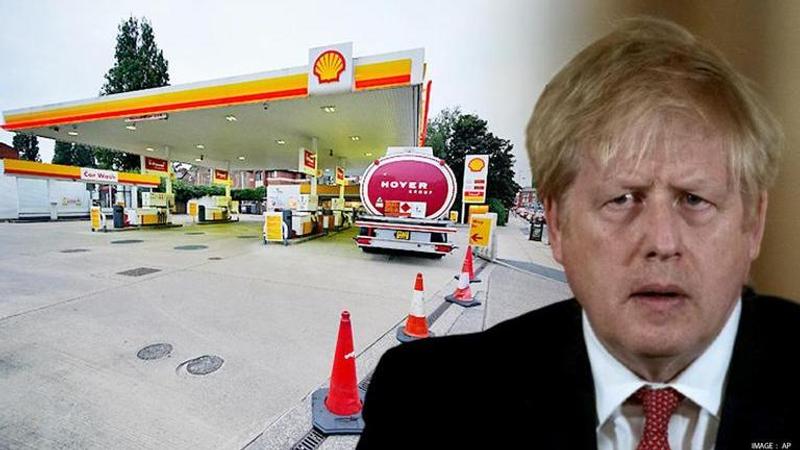Published 08:37 IST, September 27th 2021
British fuel crisis: Petrol bunks run out of fuel, UK PM considers deploying Army
UK Business Secretary Kwasi Kwarteng on Sunday suspended the competition laws for the fuel industry to allow suppliers to target filling the empty stations.

After the leading oil giants in the UK, BP and ExxonMobil-owned Esso, temporarily shut several of its petrol stations due to the lorry drivers shortage unravelling the country-wide fuel crisis, UK PM Boris Johnson on Sunday assembled hundreds of soldiers to kick start “Operation Escalin” to supply fuel in third of UK’s pumps that had run dry, the British press reported.
Petrol Retailers Association (PRA), on Sept. 26, sounded off emergency as it announced that nearly 5,500 petrol bunks constituting about 50 to 90 percent of the total outlets reported running out of diesel and petrol, adding that the rest will soon follow.
Pumps with no fuel triggered mass panic buying in the UK, prompting the British government to resort to emergency protocols. UK Business Secretary Kwasi Kwarteng on September 26 suspended the Competition Act 1998 to exempt competition in the fuel industry which will allow suppliers to target filling the empty stations. He invoked the Downstream Oil Protocol after a meeting with senior executives from the fuel industry to work constructively with fuel producers, suppliers, hauliers and retailers to ensure that disruption is minimised as far as possible,10 Downing Street informed in a statement.
In order to save the UK from the fuel crisis amplified due to lack of HGV drivers, and amid the frenzy of petrol buying at the limited operational stations where fuel was available, Boris Johnson announced taking the drastic step of sending the British Army to tackle the situation.
Deriding the hauliers of pushing the country on to the edge due to petrol and diesel running out, and blaming the pumps for ensuing ‘manufactured' chaos, UK’s Transport Secretary Tory Grant Shapps on September 26 scrambled to take stock of the situation and find means to resolve 'worsening situation'. Long queues of motorists were witnessed at the petrol stations earlier yesterday waiting for several hours amid the crunch caused in the backdrop of 100,000 heavy Goods Vehicle [HGV] drivers shortfall reported this month. UK is facing a nationwide labour shortage, which the experts have blamed on Brexit and the COVID-19 pandemic.
UK's Transport Secretary Grant Shapps in his televised remarks denied Brexit laws as being the cause of the recent fuel crisis with Sky, as he said: “I have seen people point to Brexit as the culprit here when in fact they are wrong. Not only are there very large and even larger shortages in other EU countries like Poland and Germany, which clearly can’t be because of Brexit.”
He then went on to add, “Because of Brexit, I have been able to change the law and alter the way our driving tests operate in a way that I could not have done if we were still part of the EU.”
Amid accusations of no 'plan of action', govt announces 10,500 temporary work visas
While just a month ago, the British government had rejected the appeals of the retail and logistics firms asking the Prime Minister to temporarily ease post-Brexit immigration rules to enable the haulier companies to hire truck drivers, earlier yesterday, Johnson’s government announced that it will issue 10,500 temporary work visas for lorry drivers. UK's ruling administration is now being accused of ignoring the warnings of the supply chain disruptions a few months ago when the national road transport industry estimated that a shortfall of 100,000 lorry drivers could hit the nationwide transportation.
On August 22, the British Retail Consortium had once again repeated its calls for the government to grant temporary visas to truck drivers to migrate from the European Union [EU] for recruitments, which the government had ignored. About 83 percent of UK’s recruitment firms supplying temporary drivers to bunks and supermarkets had anticipated that the looming “significant problem” arising out of the critical staff shortage months in advance. Tesco’s head of distribution had also warned the UK government that there was a risk of panic buying ahead of winters and Christmas, British media reported, but the British government had lacked a plan of action.
Several big companies in recent months resort to offering incentives including £1000 cash bonuses to attract new drivers as it got harder to get the Britons on board to fill the truck driving vacancies. Britain’s Road Haulage Association (RHA) estimated that there would be 100,000 vacancies in HGV sector by 2021 had the UK not eased the post-Brexit immigration laws.
Separately, a Logistics UK spokesman that represents hauliers told British reporters that the drivers' shortage had been “a very serious issue that needed urgent Government and industry action to resolve”.Jim McMahon, UK’s Shadow Transport Secretary, had meanwhile described the lorry driver shortage as a “rapidly worsening crisis” in a statement, adding that it had needed urgent government action on priority basis and that the accountability for the repercussions will lie at the Conservatives’ door.
Updated 08:37 IST, September 27th 2021




